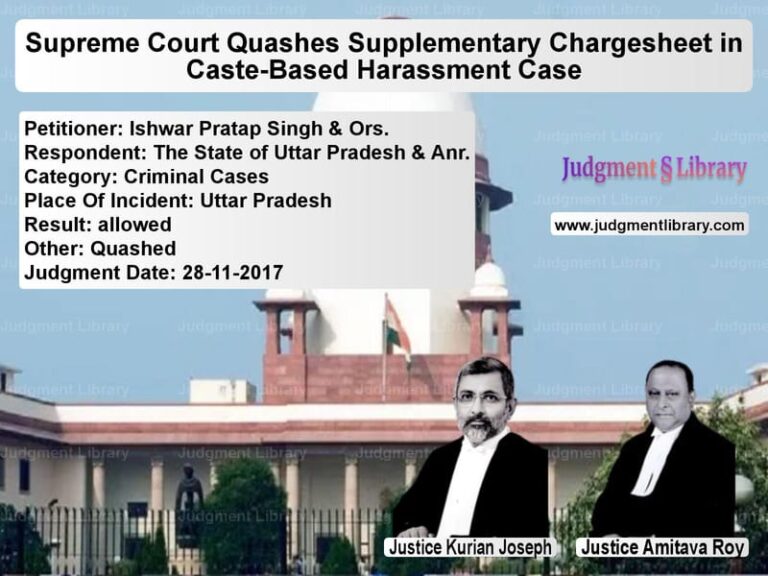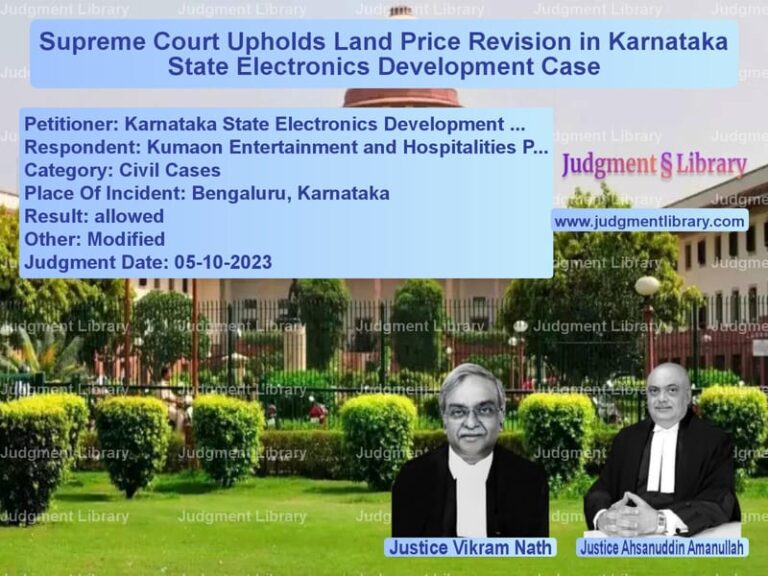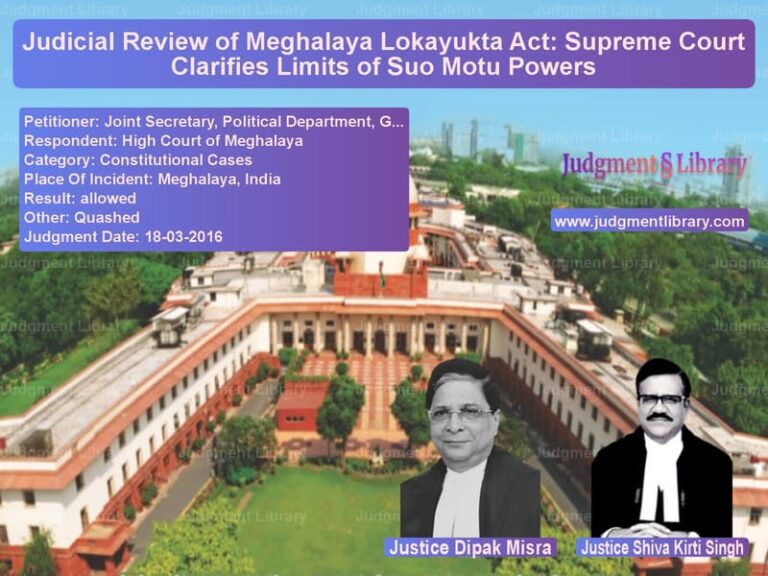Property Ownership and Recovery Disputes: Supreme Court’s Ruling in Nazir Mohamed vs. J. Kamala
The Supreme Court of India, in its judgment dated August 27, 2020, ruled on a long-standing property dispute between Nazir Mohamed and J. Kamala. The case revolved around claims of ownership, tenancy rights, and adverse possession concerning a residential property in Tamil Nadu. The ruling provided critical clarity on the rights of parties in property disputes, particularly regarding limitations in filing for recovery of possession.
The case originated when the respondent, J. Kamala, filed a suit in 1994, seeking ownership declaration and possession of a portion of the property. The trial court ruled against her, but the appellate court partially allowed her claim. The High Court subsequently ruled in her favor, granting full possession. This decision was challenged by the appellant, leading to the present Supreme Court judgment.
Background of the Case
The disputed property was located in Aduthurai, Tamil Nadu. The respondent-plaintiff claimed that her father had purchased the property in 1940 and later let it out to the appellant’s father. Upon his death, the appellant allegedly became a tenant but failed to pay rent. In contrast, the appellant-defendant contended that his father had purchased the property in 1938 and that he was the rightful owner.
The key issues in the case included:
- Whether the respondent had valid ownership rights over the suit premises.
- Whether the appellant was a tenant or had ownership rights.
- Whether the respondent’s claim for recovery of possession was barred by limitation.
Petitioner’s Arguments (Nazir Mohamed)
The appellant-defendant argued that:
- He had been in possession of the property as an owner since 1966 through a registered deed of release executed by his father.
- The claim for possession was barred by limitation, as he had enjoyed uninterrupted possession for over 28 years before the suit was filed.
- There was no proof that his father was ever a tenant, as no rent receipts or tenancy agreements were produced.
- The High Court erred in reversing the appellate court’s decision, which had rightly refused possession to the respondent.
Respondent’s Arguments (J. Kamala)
The respondent-plaintiff contended that:
- Her father had acquired the property in 1940, and the appellant’s father was a tenant.
- The appellant’s father had attorned tenancy in his name, but later stopped paying rent.
- The claim for possession was valid as she had rightful ownership and was entitled to reclaim her property.
- The High Court had correctly recognized her ownership and possession rights.
Supreme Court’s Observations
The Supreme Court carefully examined the legal aspects of the case, making key observations:
- The respondent failed to establish that the appellant’s father was ever a tenant.
- The absence of rent receipts or tenancy documents weakened the respondent’s claim.
- The appellate court’s decision to deny possession was reasonable, given the long-standing possession of the appellant.
- Recovery of possession was barred by limitation under the Limitation Act, 1963.
- Ownership alone does not automatically entitle a plaintiff to possession, especially if the defendant has been in possession for decades.
Final Verdict
The Supreme Court ruled that:
- The High Court erred in granting possession to the respondent.
- The appellate court’s ruling, which granted only a declaration of ownership but denied possession, was restored.
- The suit for possession was dismissed as being time-barred.
- The appellant could continue to occupy the property.
Impact of the Judgment
This ruling has important implications for property law:
- It reinforces that claims for possession must be filed within the limitation period.
- It highlights the importance of documentary proof in tenancy disputes.
- It clarifies that ownership does not always grant automatic possession rights.
- It sets a precedent for property disputes involving long-standing possession.
The Supreme Court’s ruling ensures that possession rights are not arbitrarily disturbed and that property claims must be substantiated with clear legal proof.
Petitioner Name: Nazir Mohamed.Respondent Name: J. Kamala & Others.Judgment By: Justice Indira Banerjee, Justice Navin Sinha.Place Of Incident: Aduthurai, Tamil Nadu.Judgment Date: 27-08-2020.
Don’t miss out on the full details! Download the complete judgment in PDF format below and gain valuable insights instantly!
Download Judgment: Nazir Mohamed vs J. Kamala & Others Supreme Court of India Judgment Dated 27-08-2020.pdf
Direct Downlaod Judgment: Direct downlaod this Judgment
See all petitions in Property Disputes
See all petitions in Landlord-Tenant Disputes
See all petitions in Specific Performance
See all petitions in Judgment by Indira Banerjee
See all petitions in Judgment by Navin Sinha
See all petitions in allowed
See all petitions in Modified
See all petitions in supreme court of India judgments August 2020
See all petitions in 2020 judgments
See all posts in Civil Cases Category
See all allowed petitions in Civil Cases Category
See all Dismissed petitions in Civil Cases Category
See all partially allowed petitions in Civil Cases Category







